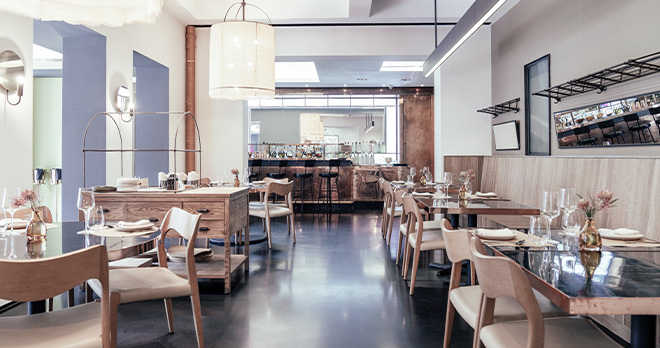Reflecting on the ‘Retail Reboot’ | Legal Thinking Podcast
This podcast transcript has been edited in places for readability. You can also listen to our podcast on your podcast platform of choice - find it here >
In today’s episode we mark approximately two years since the launch of RWK Goodman’s Retail Reboot Report. So to mark that we reflect on the Retail Reboot Report with two of our guests who are Vicky Hernandez who is a partner and head of retail at RWK Goodman and Graham Soult who is a retail consultant who supports shops and high streets UK wide and he is the owner and retail consultant at CannyInsights.com. In today’s episode we discuss the legal and regulatory shifts that have happened on the high street since 2021, changes to data protection and privacy regulation and how sustainability and environmental concerns have become more prominent in recent years as well, amongst much more actually, this is a really kind of well rounded conversation about the changes on our high street but specifically since 2021 which is when the Retail Reboot Report came out.
Graham in the report you featured in – Retail Reboot – the high street was undergoing a transformation. Could you provide us with an overview of the significant changes that have occurred on the high street since 2021, which is when the report came out?
Graham Soult: I can yeah, it feels like a long time ago as obviously back in ‘21 we were still in the middle of Covid and there was all kinds of things happening that were unexpected and completely new.
But I suppose if you look at where the high street is now it’s probably in a healthier position than you would have expected, despite all the challenges that are out there in terms of cost of living and energy bills and things. And part of the reason for that is what we’ve seen is the online growth that took place during Covid, where we had no option but to shop online in many cases, that has kind of stalled, so online shopping is kind of where it would have been if Covid hadn’t happened.
So that increase that happened during Covid has peaked and come down a bit and the high street has in a sense come back a bit because I think, post Covid, people have got back into their old habits but there’s also a bit of a sense that I’m sure we’ll explore in more detail around people wanting that connection to the places that they live in.
And Vicky, in the report we emphasised the need for retailers to adapt, to reinvent themselves. How have retailers responded to these challenges since the release of the report?
Vicky Hernandez: I think, I think Graham’s right; during Covid we had this real drive to shop local and people really wanted to support their local high street- sort of remember, it’s hard, it feels like a long time ago but you sort of remember those times when the local retailers and farm shops etc really kind of stepped in and supported us and we all wanted to repay the favour.
I think that has fallen away a bit, but certainly lots of my retail clients very much shifted to slightly different ways of operating, so you know almost using their retail shops as a mini distribution hub for a time, and I think we’ve retained that a little bit but you know people are shifting location slightly, the city is still not what it was in London.
The outlet villages in my experience are still really buoyant, people want to be there, they are you know some of the most successful stores for retailers but I think the local thing has stayed with us and we’re certainly acting for a lot more you know not just the big name clients but sort of retailers who’ve got you know maybe four or five outlets and perhaps are finding a bit of a renaissance there, and more support than they were pre-Covid, because to a degree consumers are probably still shopping a bit more local and wanting that more bespoke sort of independent retail offering.
The report highlighted the impact the pandemic of course had on the high street, I mean it did come out in 2021. Have either of you witnessed any notable legal shifts or regulatory changes that have directly influenced retailers or their operations in the past couple of years?
Vicky: I mean I speak to legal shifts I suppose, we’re certainly seeing you know in terms of leases for example a lot more flexibility, it’s not really a regulatory change as such but retailers are wanting short leases, leases with early termination right break clauses and perhaps also flexibility around sharing occupation, because you know lots of different concessions can share one space. And we’re certainly, when acting for retailers, being asked to try and build in the option either to terminate quicker or to share occupation or just be perhaps more creative with the way they are using the space that maybe once upon a time they would have just occupied on their own on a twenty five year lease; which seems a long time ago now.
Graham anything to add on that one about legal shifts or regulatory changes over the couple of years?
Graham: Yeah obviously I’m no lawyer so I can’t comment on the legal thing really but in terms of leases I think Vicky’s absolutely right.
Even before Covid we were seeing leases becoming a lot more flexible, five years maybe than kind of twenty five of old, or even more sometimes in the past, and the break clauses and the flexibility and I think to be fair to landlords a lot of landlords you know being more kind of agile and more responsive and more flexible in how they do business.
I suppose another fact of it, isn’t really legal but it’s about regulation and the constraints within which retailers work is business rates of course and we saw from 1 April that quite a lot of business rates in many places did come down as part of the revaluation. So I do lots of work in Durham for example and we saw that in Durham quite a lot of business rates on properties have fallen by about a third compared to what they were before 1 April, so it still makes business rates a very big barrier to overcome in many cases but obviously any reduction is always welcome and it starts to make it a bit more likely that some retailers and businesses who are currently trading will be able to stay, and that some others who might have considered trading in a location will think actually it's starting to become a bit more realistic now.
One of the key focuses of the report was the rise of e-commerce and it’s impact on traditional brick and mortar stores. How has the balance between offline and online retail evolved since 2021 and what considerations have emerged as retailers navigate this new landscape?
Graham: Well I suppose quite a few of the key things have already been mentioned but I suppose what we’re seeing that’s quite interesting is that the purely e-commerce retailers have often struggled, some of the ones like Boohoo and Asos have been struggling a bit and finding that they’ve got too much warehouse capacity and they are having to deal with the cost of returns and things and actually it’s the retailers who seem to be straddling bricks and mortar and e-commerce who are the ones who are doing well.
And on the topic of returns we’re also seeing that charging is starting to come in for that as well so that people are starting to realise that a free return isn’t really free, it does have a cost in terms of what that cost is on the business and so that I think is a really interesting trend where more and more retailers are starting to pass on at least some of the true cost of returning items on to consumers and so whether that then has an impact on how people shop that’s something that we’ll have to keep an eye on.
Vicky: Yeah I think it’s interesting isn’t it because a couple of years back you know there was a view that everything was going to go online and the high street would die and that obviously hasn’t played out, but I think that those retailers who are doing both online and offline retail do seem to be succeeding, certainly a lot of them.
For our clients some of the sort of shoot offs of that are dealing with things like turnover rents for example, I don’t think we’ve mentioned them yet in this Podcast but we’ve certainly found that turnover rent leases are a lot more common. I mean they were always common in certain types of retail destination but a lot more common across the board so that landlords and tenants in effect share the potential pain and gain of a tenant’s trading figures but one of the challenges that we now find with that is what counts as turnover because you’ve got stores where tenants were you know originally just selling what was in the store and now they are maybe doing click and collect orders online or they are moving stock between stores a lot more frequently than they would have done so we’re really I think navigating that change and you know landlords and tenants trying to work together to work out what’s fair and what should be included in turnover is very much a result of that sort of change in the way that retailers are trading.
Earlier on Graham you mentioned one of the changes to the high street is people want to have a far larger connection with the places that they live in, can you expand a little bit upon that?
Graham: Yeah I think it was partly a Covid thing of people like me have always been banging on about shop local for ages and the way in which if you spend a pound locally it filters through the economy and so on, but I suppose that always felt a bit niche and didn’t really cut through until Covid and then people suddenly kind of I think realised what the importance of these local businesses were.
And what is really nice is that my sense from being immersed in those kind of places and those kinds of messages is that people are still very receptive to that kind of storytelling, that idea that actually if you, if you support a local business it’s supporting a local family, it’s you know all that kind of thing is, is I think resonating now in a way that it maybe wasn’t before which is, is really good because it makes it much easier in a way to encourage people to support and visit independents on their high street and they understand I think the impact of that and it’s partly about people also I suppose seeing those retailers who are the big multi nationals who maybe aren’t seen as paying back all that they should to the countries and locations in which they trade so that I think is a really positive thing and it seems to be a long term impact of Covid which is a good thing really.
You say long term, but let me just clarify and get you to look into your crystal ball, do you think, so we did the Retail Reboot Report two years ago, do you think if we jumped on this Podcast again in another two years’ time that will be a trend that will have remained?
Graham: I think so and it’s partly because if you look at high streets in many towns and cities a lot of the growth is coming from independents anyway. Because what happened during Covid is that the low hanging fruit, if you like, all those big name retailers who were already teetering on the brink fell over the edge unfortunately and there hasn’t actually been all that much in way of other businesses going bust since then.
But actually in terms of the growth yes there are some brands still expanding and that’s very welcome but a lot of the growth is independent so again in Durham to give an example I reckon about seventy five, eighty percent of the new businesses opening in Durham are independent. Quite a lot of them are cafés and restaurants and hospitality but others are things like book shops.
We’ve had two new book shops open in Durham in the last year and those kind of businesses tend to be really good at not just selling stuff but using the marketing channels really effectively and building a whole community around their brand and around their events and around what they are contributing to the place so I think that is a really powerful trend and my sense is that it’s here to say.
Vicky to jump back to you for a question the Report: back in 2021 you discussed the importance of data protection and privacy in the retail industry, have there been any significant legal developments or changes in consumer data protection since our previous conversation?
Vicky: Well we’ve obviously got, off the back of Brexit, the new data protection bill and legislation. I mean I don’t think it significantly changes the position but well we’ve all seen in the news recently haven’t we that there seems to be a series of big retailers suffering data breaches. We’ve had, you know, JD Sports and Boots and WH Smith, I think T Mobile were mentioned yesterday, so I suppose it’s not so much that the law has changed but that it will become ever more stringent.
And I think you know this particularly, you would have thought the big retailers would be getting it right and clearly are struggling in terms of you know privacy and protecting the information but I think you know going back to those smaller retailers sometimes we do talk to them and they don’t necessarily understand you know what they are supposed to be doing, what data they are allowed to keep you know I don’t know take away businesses for example so it is something that they need to learn because obviously the penalties for data breaches and for keeping information you shouldn’t are potentially quite large so not so much a change but I think it will become, it’s newsworthy already and I think it will remain in the news until we start doing it better, for want of a better way of putting it.
And staying on kind of newsworthy topics, sustainability and environmental concerns have been very prominent in recent years. What legal measures or regulations have emerged to address these issues on the high street and how have they impacted retailers?
Vicky: I think well from a legal point of view I mean this actually goes back to Graham’s point as well about, you know, people wanting to shop local. And I think one of the big drivers for that is actually an environmental one and hopefully local supply chains and not hundreds of miles of produce going around the country but we are certainly in terms of leases, green leases are very much on the agenda, you know some of the larger landlords you know years back if you were a new tenant going in you would be expected to strip out a unit, do a completely new shop fit, new everything you know leases would say you can’t use, it has to be new products, you can’t use you know recycle and reuse shop fit, that has turned on its head.
I think there’s a lot of talk about it and perhaps not quite so much doing yet but if you look at you know green leases are a subject of a lot of conversations and if you look at any lease from an institutional landlord now they you know you’ve got five, ten pages of environmental type clauses about measuring utility consumption you know working together to reduce energy consumption just the whole lot is being dealt with but I think it’s a, it’s an ongoing conversation and it will link in also to the EPC regime of course because at the moment you have to have a minimum E rating to let your commercial property but the intention is that will increase to C and then B you know by the end, by 2030 so there is an ongoing debate I suppose about who should pay for works, what works need to be done, when they will be done to minimise disruption so that you know is very much at the top of the agenda I would say.
And Graham to come back to you; the Report in 2021 touched upon the challenges faced by local independent retailers and we discussed them of course just a few minutes ago, has there been any interventions or initiatives aimed at supporting and protecting these businesses since the Report?
Graham: That’s a good question. I suppose a lot of the support for independents tends to be at a local level so for example the work that I do in County Durham is funded by the County Council in Chester-Le-Street, the Parish Council in Durham, and you tend to get lots of locally targeted business support schemes that are providing training or one to one support or whatever it might be.
Certainly as a principle my experience is that if you can provide some kind of local support scheme it generally is very useful because I think it has been touched on there by Vicky that sometimes independents don’t always have all the information that they need, a lot of them are really savvy but not all of them and so if you can provide some kind of support locally, have someone available who can provide advice and mentoring that I think is really good because ultimately if you invest that resource in working with retailers and promoting places it does genuinely have an impact in making those retailers more likely to succeed and not make big mistakes.
But also if you engage in the place promotion it certainly helps attract new businesses and that’s the kind of thing that I have been doing lots of in Durham and we know that by putting out positive messages about the place and about the strength of the independent community there that does attract new businesses as well.
And our listeners won’t be surprised to hear that technology continues to shape the retail sector, could you shed any light on any challenges or considerations that have arisen due to advancements in areas such as AI automation or augmented reality?
Graham: I’ll be honest I’ve spent the last ten or fifteen years going to retail conferences and things where people have been talking about all this kind of stuff and it’s, I can’t think of one example where I’ve been out in the streets in Durham and a retailer said to me “oh, Graham, tell me about AI!”.
I think there’s always a bit of a disconnect between what tech is being talked about in the retail press and at conferences and what actually on the ground businesses are doing so I’m, I suppose I’m a bit of a sceptic to be honest because I’ve seen so many examples of the, of the next big thing and, and actually the fundamentals of retailing are about being in the right premises and the right place, selling the right stuff to the right people and doing it in a way that grabs customers and delights them. And I suppose whatever tech you have it can’t be a substitute for the fundamentals of being a great retailer.
Vicky I’ll bring you in on this question as well but just given the context we were talking to you about data privacy a second ago, the first thing that of course jumps to my mind is the great kind of recommendation algorithm so information on a customer saying “ah well he bought this from us a few weeks ago, we think he might be interested in this”, but coming back to again data collection do you think that’s there almost a pullback sometimes from customers when the algorithm is kind of a little bit too good?
Vicky: I think sometimes people are surprised, aren’t they? You know if you are on Google and it remembers what you looked at and then it starts trying to sell you the thing when you’re looking on Facebook or whatever it might be…
I think some consumers are perhaps a bit naïve about how much of their information is out there and available and how much is tracked. There’s certainly I guess a group of people who are trying to fight against that but as it stands I think that big corporations certainly at the moment know a lot more about us than we probably know and would be happy with if we did realise.
And my final question, looking ahead what hurdles do you anticipate retailers will face on the high street in the next few years and what steps can they take to proactively address these challenges? Graham let’s come to you first.
Graham: Right, crikey. Well I suppose, I suppose retailers have already been facing quite a lot of challenges as if you think about it all these bricks and mortar businesses have successfully navigated Covid for the most part and now they are having to deal with all the things around the cost of living and energy bills and I always think it’s to their credit that so many businesses have managed to get through all that and in some cases are still performing really well.
So there’s a sense almost that if you can get through Covid you can deal with anything but I suppose in a sense we can’t quite know what is on the horizon. If Covid and the last few years has taught us one thing it’s that we can’t always predict what the future holds, but I think businesses on the high street have proved how resilient and how agile they are in many cases but it looks like it’s still going to be a tough year or two ahead.
I don’t think there’s a sense that the economy is suddenly going to spring back into life and people are going to have loads of money to spend again so it comes, it comes back to those fundamentals again of just being really good at what you do and making sure that everybody who might be a customer of yours knows what you’re offering and is able to come and support you.
Vicky: Yeah I think that’s right, those retailers who have been most successful over the last few years I think have really shown how flexible and adaptable they can be and that’s not going to change in the short term is it with the you know the cost of living crisis and the economy.
I see local businesses on my local high street shifting so you know once upon a time they were just a café and now they are a workspace and people who work from home you know can spend the morning using their Wi-Fi; I think it’s about becoming more of a destination than just doing one thing but very much being adaptable to the circumstances and the younger generation, because they have quite different ideas I would say about spending and what they want to use their money on and the kind of ethical side of things.
I think those retailers that we’ll be talking about ten years from now will be ones who embrace that and being willing to change when it hasn’t always been easy to do so.
Graham and Vicky, thank you very much for your time.

Subscribe to Legal Thinking
Want to hear more from our podcast?
Find out where you can subscribe and check our our back catalogue right here on our website.
More insights from our Retail and Real Estate teams
View more articles related to Real Estate and Retail, Leisure & Hospitality







